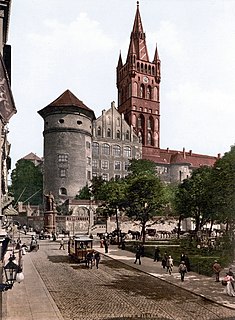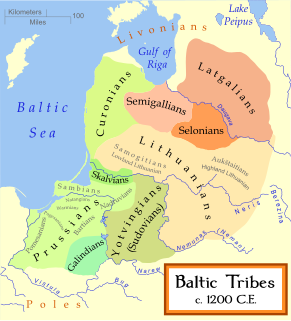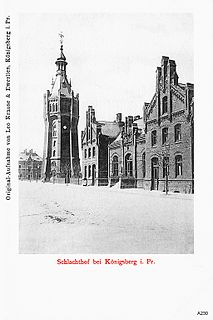This article needs additional citations for verification .(December 2012) (Learn how and when to remove this template message) |
Tragheimer Palve was first a suburb of and then a quarter of northern Königsberg, Germany. Its territory is now part of the Leningradsky District of Kaliningrad, Russia.
A quarter is a section of an urban settlement.

Königsberg is the name for a former German city that is now Kaliningrad, Russia. Originally a Sambian or Old Prussian city, it later belonged to the State of the Teutonic Order, the Duchy of Prussia, the Kingdom of Prussia, the German Empire, the Weimar Republic and Nazi Germany until 1945. After being largely destroyed in World War II by Allied bombing and Soviet forces and annexed by the Soviet Union thereafter, the city was renamed Kaliningrad. Few traces of the former Königsberg remain today.

Germany, officially the Federal Republic of Germany, is a country in Central and Western Europe, lying between the Baltic and North Seas to the north, and the Alps to the south. It borders Denmark to the north, Poland and the Czech Republic to the east, Austria and Switzerland to the south, France to the southwest, and Luxembourg, Belgium and the Netherlands to the west.
Named after the Old Prussian village Tragheim, Tragheimer Palve was once an unfruitful heath (Palve in the Old Prussian language). [1] By 1618 it contained a paper mill. The suburb was incorporated into Königsberg by 1908. It began to be developed during the era of the Weimar Republic. Tragheimer Palve was bordered by Tragheimsdorf to the south, Maraunenhof to the east, Ballieth to the north, Hardershof to the west, and Vorderhufen to the southwest. Its main thoroughfare was Samitter Allee, renamed General Litzmann Straße by the Nazi Party.

Old Prussians or Baltic Prussians refers to the indigenous peoples from a cluster of Baltic tribes that inhabited the region of Prussia. This region lent its name to the later state of Prussia. It was located on the south-eastern shore of the Baltic Sea between the Vistula Lagoon to the west and the Curonian Lagoon to the east. The people spoke a language now known as Old Prussian and followed pagan Prussian mythology.
Tragheim was a quarter of northern Königsberg, Germany. Its territory is now part of Kaliningrad, Russia.

Old Prussian is an extinct Baltic language once spoken by the Old Prussians, the Baltic peoples of the Prussian region. The language is called Old Prussian to avoid confusion with the German dialects of Low Prussian and High Prussian and with the adjective Prussian as it relates to the later German state. Old Prussian began to be written down in the Latin alphabet in about the 13th century, and a small amount of literature in the language survives.
Located along Samitter Allee between Tragheimer Palve and Tragheimsdorf was the Dr.Friedrich-Lange-Platz, a stadium named after Dr. Friedrich Lange in 1931. It was originally built as the Palästra-Sportplatz by the Palästra Albertina in 1914. SpVgg ASCO Königsberg and its predecessor clubs were based out of the stadium from 1919 until 1926.

Friedrich Lange was a German surgeon and supporter of charitable institutions. He was a fraternity member of the Burschenschaft Gothia Königsberg.
SpVgg ASCO Königsberg was a German association football club from the city of Königsberg, East Prussia. The club was formed in 1919 out of the merger of Sportclub Ostpreußen 1902 Königsberg and Akademischer Sportclub Königsberg. It played at the Hammerteich-Sportplatz in Ratshof.



